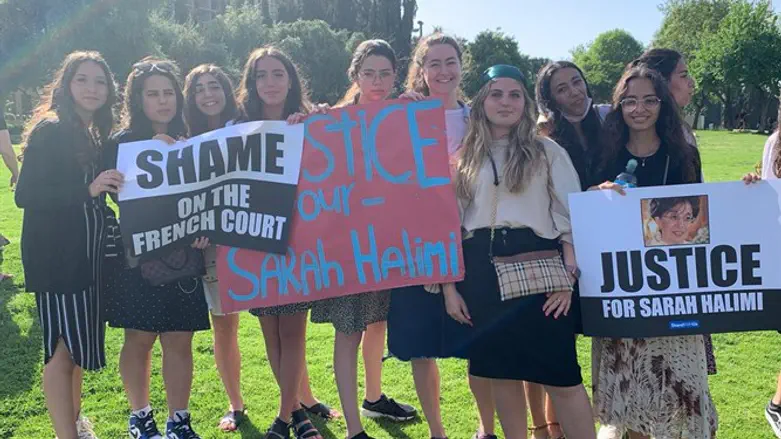
Following the decision of the court in France not to prosecute the murderer of Sarah Halimi, a demonstration was held in Jerusalem in which the girls of the 'Hemdat HaDarom' program for girls from France also participated. On the demonstration and the feelings following the decision in France.
The Arutz Sheva Jerusalem studio hosted Rabbi Aryeh Kling, head of the program, and Shirel, one of the students, to talk about the demonstration and their feelings following the French court's decision.
Rabbi Kling emphasizes that the demonstration that took place in Jerusalem is one of a series of demonstrations that took place around the world. The largest demonstration took place in France , while other demonstrations took place simultaneously around the world. Two of the demonstrations took place in Israel under the call to transfer the legal case to Israel.
He says that the case could no longer be changed in France, but stressed the importance of protesting over how such a clearly anti-Semitic act does not result in prosecution, which would not be the case if it was a different form of bigotry. In this case the court based its decision not to bring the murderer to trial because he consumed drugs before committing the act.
Shirel, who came to Israel from Paris, relates her feelings about the case. "It is important because we are French. She is like our grandmother, like our sister, who was murdered just because she is Jewish," she says, adding that during the demonstration she felt she also represented her family who were prevented from protesting due to coronavirus restrictions in France.
"Sarah has the facial expressions of a typical Jewish grandmother, so it is very easy to identify and feel as if she is the grandmother of each and every one," says Rabbi Kling, who sees the indifference of the judicial system to the murder of a Jewish woman as another step in the sequence of events which have led to the alienation of French Jews from their country.
Has the situation deteriorated to the point of fear? Shirel says that there are places in Paris where Jews are indeed afraid to walk. "This is not going to change demographically," says Rabbi Kling, noting that anyone who wants to be elected to any position understands that the number of Muslims is ten times the number of Jews, making protecting Jews "less affordable." All candidates are careful to make statements that sound good about providing security, "but we do not see them going out of their way for the benefit of the Jews."
On the calls following such cases for the immigration of French Jews to Israel, Rabbi Kling says that there is already a deep understanding that there is no future for Jews and Judaism in France. "It does not mean that they will immigrate to Israel tomorrow morning, and unfortunately they may also move to other places, but the feeling is that it will no longer be what it used to be."
In his remarks, Rabbi Kling notes that French police officers were present at the murder scene after being summoned to the scene by Sarah Halimi's neighbors. "The police were there for twenty minutes, heard her cries and shouts as she was tortured and did nothing. There is a suspicion that the judge did not demand a re-enactment of the incident to cover up for the police. This means that although we have become accustomed to anti-Semitic acts, there is now a feeling that not everything is being done to put our finger on the sore spots. Jews understood this and so there is an awakening now."
